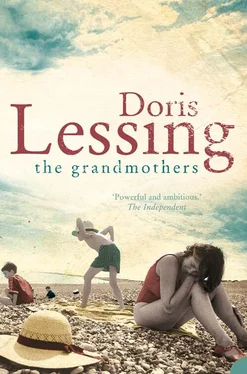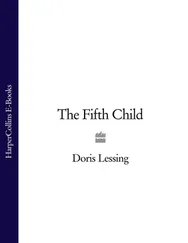Doris Lessing - The Grandmothers
Здесь есть возможность читать онлайн «Doris Lessing - The Grandmothers» весь текст электронной книги совершенно бесплатно (целиком полную версию без сокращений). В некоторых случаях можно слушать аудио, скачать через торрент в формате fb2 и присутствует краткое содержание. Жанр: Старинная литература, на английском языке. Описание произведения, (предисловие) а так же отзывы посетителей доступны на портале библиотеки ЛибКат.
- Название:The Grandmothers
- Автор:
- Жанр:
- Год:неизвестен
- ISBN:нет данных
- Рейтинг книги:3 / 5. Голосов: 1
-
Избранное:Добавить в избранное
- Отзывы:
-
Ваша оценка:
- 60
- 1
- 2
- 3
- 4
- 5
The Grandmothers: краткое содержание, описание и аннотация
Предлагаем к чтению аннотацию, описание, краткое содержание или предисловие (зависит от того, что написал сам автор книги «The Grandmothers»). Если вы не нашли необходимую информацию о книге — напишите в комментариях, мы постараемся отыскать её.
The Grandmothers — читать онлайн бесплатно полную книгу (весь текст) целиком
Ниже представлен текст книги, разбитый по страницам. Система сохранения места последней прочитанной страницы, позволяет с удобством читать онлайн бесплатно книгу «The Grandmothers», без необходимости каждый раз заново искать на чём Вы остановились. Поставьте закладку, и сможете в любой момент перейти на страницу, на которой закончили чтение.
Интервал:
Закладка:
‘I see, and you don’t care.’
James might have said that if he were in Daphne’s arms the whole bloody British Empire could sink into the sea.
He said, ‘Well, sir, I don’t imagine what we think about it will make much difference to what happens.’
And now his voice was full of trouble. One reason why he didn’t like to think about politics was that if he did he had to think about the war, and that meant being engulfed in horror, an incredulous, unbelieving, protest that this war was happening at all. He knew that he dreamed about it, the enormity, the weight of it.
Colonel Grant looked sharply at the young man, whom he had been ready to convict of unfeeling. Rut no, that was not it, there was real pain there, and those blue eyes, which the Colonel thought of as English, were unhappy.
The Grants asked James and some others, one of them Second Lieutenant Jack Reeves, at the height of the hot season, for a week in the hills. They took the long slow train up into the hills and found themselves in a little cottage, that had English flowers in the garden. The winds blew cool and fresh and there was no dust. The villas and houses were called Elm Place, Wisteria Lodge, Kent Cottage, Hollyhock Close. Mrs Grant, no longer flushed with heat, though the neck of her dress showed a raddled red vee, revealed herself as an unremarkable, non-complaining hostess, but with a tendency to fuss, perhaps because she was feeling guilty. ‘James, you really must take care, I heard you coughing again last night. And you too Jack, here’s some linctus.’ The Colonel, evidently and touchingly relieved by his wife’s return to normality, could be seen looking at her with - was that actually affection? Concern? Hope?. The young observe their elders’ marriages with politeness and a secret resolve never to marry; or, if I do it won’t be to anybody like that old bag’.
The walks up here were pleasant. There was riding. James didn’t ride but the others did. Simply to sit and breathe clean air was a treat. Down in the plains, in the heat, at Camp X, they were sweating as they stood, and it was impossible to sleep. Soon, too soon, these four soldiers would be back down in it, but in the meantime …
James sat on the little verandah with a book and sometimes the Colonel sat with him. There was a wistfulness about him now that James, schooled by long observation of his father, had to recognise as regret. ‘It is a sad thing,’ the Colonel observed, more than once, ‘to have spent your life doing a job you thought was worthwhile and then you find you’re not valued.’
Colonel Grant was lonely: that was James’s discovery on this holiday. But he had a wife, didn’t he? Well, yes, he did, but … Presumably be had cronies? Now James thought of his father and knew he was lonely: he came to his father’s loneliness by way of Colonel Grant’s. Yet there were the old soldiers’ evenings in the pub, and he did come home to a wife - with whom he did not talk. What would Colonel Grant like to say, if he could, and to whom? Was his trouble only a need to grumble about not being appreciated? No, there was something deeper diere and James knew how-to respond, in his thoughts at least: after all, he could never speak to anyone about his real self. And his father: what thoughts was he holding safe, in his silences?
Even when the Colonel was not there, James was not alone. In the bungalow (‘Butler’s Lawn’) was a young English couple with a child, a little boy, just walking, or rather, staggering, with his ayah always on the watch. This little creature had taken a fancy to James, perhaps because of the young mans interest in him, and from the verandah of his house he watched James, who was standing watching him on the verandah of the next house. The ayah took to bringing the infant over, to play his new games of crawling, and sitting, clambering up and sitting, while James, tucking bis long legs well aside so as not to impede the child’s efforts, was as ready as the nanny to prevent harm. The child did not like sitting on laps, but he did like standing in front of James, legs apart, and then sitting, on his padded bottom, and laughing, and getting up, assisted by James. All this the Colonel watched and so did Mrs Grant. Not usual for a young man to bother with an infant.
‘Do you have brothers and sisters?’ enquired the Colonel.
‘No, I was an only child:
‘Perhaps that accounts for it … that child really does like you -look, Mildred. ‘And Mrs Grant stood in the door, briefly, to commend the young man, who could have done without the attention. He would have liked to be alone with this little creature, roughly the same age as his child, faraway in South Africa. He wanted to persuade the little boy to sit on his knee, so he could look close into those blue bright eyes and perhaps hug him, feel the warm energetic body - hold this child and think of his own. But the ayah never let him out of her sight.
The Colonel sat with his old legs stretched out, his old hands trembling a little, a glass of whisky beside him, watching the young man and the child. His sous were grown up and were about the world, soldiers, one in danger in Burma. The Colonel was perhaps remembering his own children as attractive imps of promise, contrasting them with what they were now, as the old tend to do, when he saw this little lump of love, clutching at James’s knees as he fell back, to save himself, laughing and crowing with delight. On the Colonel’s face the tend crest smile. And on James’s face too.
‘When the war is over it will be your turn,* said the Colonel to the young man.
It is my turn already, exulted James privately, while he said, ‘Yes, sir, I hope so.’
Time passes … well, it does, one has to acknowledge that, but it does not pass evenly, and that quite apart from the everyday phenomenon of the different pace of time at three years, thirteen, thirty, sixty, ninety, which we all experience. Time moves differently in different places; in Camp X it crawled.
Colonel Grant, appealed to (tactfully) by James as to whether there would ever be a prospect of being sent somewhere more interesting, replied only that ‘They had to be always ready for trouble wherever it appears.’
‘Trouble’ was already not only evident, but increasing, even if you didn’t read the papers or listen to the wireless. ‘Troublemakers’, as the Colonel put it, were increasingly at their work, and ‘disaffection’ was everywhere like a heat rash.
Companies from Camp X were sent to ‘deal with it’. James, too, more than once. He did sympathise with the soldiers grumbling openly that they were expected to fight an enemy, not to ‘put down’ Indians. Jack Reeves, too, said he was a hit of a lied, but was even more so now he was seeing the Raj at work.
A song was being sung everywhere in Camp X, not only by the Other Ranks:
What did you do in the war, Dad?
I kept the Indians down,
Yes, we kepi the Indians down …
Complaints and grumbling at Camp X were alleviated in one way by the arrival of an Entertainment Officer - Donald Enright, now Adjutant Enright - but exacerbated in another because Donald was an open and proselytising Red.
That these hundreds of bored young men needed entertainment no one could deny.
Donald was pleased to see James, but surely not as much as deserved a year of companionship? Well, he had had acolytes since. He was now a large, assertive, extrovert voting man, full of bonhomie and goodwill. Wherever he went he was in the centre of a loud group. He moved about the camp collecting admirers like - well, like a politician.
He at once organised a concert party, using an impressive number of the troops, but the audience was bound to outnumber performers by many times to one. James was roped in: he was a girl, but this did not bother him at all: not for him the protests and bad jests obligatory at such moments. In his mind he often embraced the loveliest woman in the world, and he was the father of a delightful boy child. He surprised himself and the audience with his vigorous interpretation of a coy maiden. Jack showed a talent for this kind of thing and was soon writing sketches for Donald. Then Donald put on Priestley’s They Came to a City, that play which during the war more than any other embodied idealistic and perfervid dreams for a better life. He ventured on Shakespeare and Twelfth Night. The soldiers went to see it because there was nothing better to do, but were persuaded that they enjoyed it. Some did.
Читать дальшеИнтервал:
Закладка:
Похожие книги на «The Grandmothers»
Представляем Вашему вниманию похожие книги на «The Grandmothers» списком для выбора. Мы отобрали схожую по названию и смыслу литературу в надежде предоставить читателям больше вариантов отыскать новые, интересные, ещё непрочитанные произведения.
Обсуждение, отзывы о книге «The Grandmothers» и просто собственные мнения читателей. Оставьте ваши комментарии, напишите, что Вы думаете о произведении, его смысле или главных героях. Укажите что конкретно понравилось, а что нет, и почему Вы так считаете.












